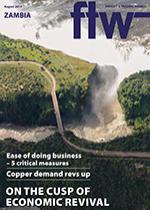Rail in Zambia and neighbouring countries will only reach its full potential if the state focuses on upgrading and maintaining the permanent way and allows the private sector to run the locomotives and rail trucks, says Phesto Musonda, chairman and CEO of Mitchell Cotts Zambia.
Musonda, the former chairman of the Zambia International Trade Fair, says “we need to separate the rail infrastructure from the rolling stock”.
His model would allow existing trucking companies to move into rail – by purchasing their own wagons and even locomotives. There needs to be competition on rail because there would be little benefit in going from a public to a private monopoly.
It is, in fact, exactly what is happening on road, he points out. Users of the rail permanent way would pay fees in the same way as trucks pay tolls – and this would provide income for the stateowned companies to upgrade the existing rail infrastructure.
Rail would, however, need to be liberalised throughout the region to allow the privately owned trains to travel freely across borders – in the same way as road freight does today. An efficient and cost-effective rail logistics system will promote economic development and job creation in the region, he believes.
As chairman of the Zambia International Trade Fair he attended numerous conferences where the logistics challenges facing Africa as a whole and the SADC region in particular were discussed.
“If you look back at Ndola in its manufacturing heyday, companies were competitive because we had an efficient rail system. But the rail infrastructure did not expand to meet demand.”
Companies that had manufacturing facilities in Ndola include Land Rover, Dunlop Tyres, and Johnson & Johnson. All the big manufacturers closed their doors between 1980 and 2000.
Public private partnerships provide the only solution to revitalising manufacturing in the city and elsewhere in the region – the private sector will raise the funds needed for rolling stock, and will take the risks of being able to attract enough business to provide a return.
Cash-strapped governments have other social priorities, and will not be able to raise the money needed for the state-owned enterprises, he says.
“I appeal to all governments in the region to allow the private sector to drive economic growth.
“Governments themselves stand to benefit because the more profitable the private sector is, the more taxes we pay, and the more money government has to distribute to the needy and to invest in infrastructure,” he says.
INSERT
Rail would need to be liberalised throughout the region to allow the privately owned trains to travel freely across borders. – Phesto Musonda

